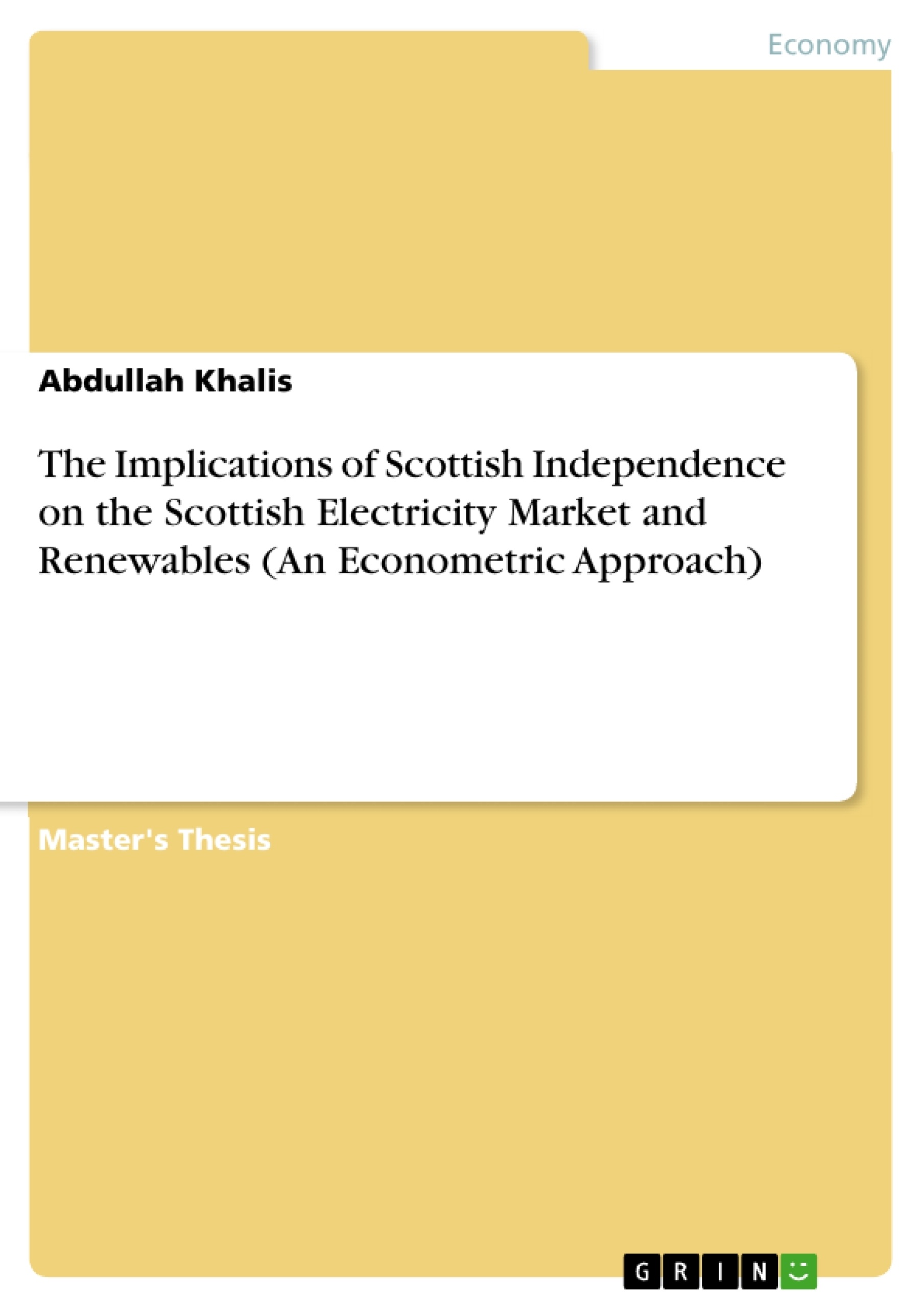Using an Econometric Approach (VAR model), I will be studying the implications of Scottish independence on the Electricity market and its consumers in Scotland. In other words this dissertation studies whether it’s better for Scotland to function within the UK framework or function independently from an Economic perspective. To answer this, an Econometric Model alone would not be sufficient due to the limitation of data problem, thus results would not be 100% accurate. To overcome this, I will be discussing some of the possible alternatives and scenarios that might occur if the Independence Occurs, and what repercussion each scenario might have.
Inhaltsverzeichnis (Table of Contents)
- Introduction:
- Literature Review:
- Overview of the current UK Electricity Market:
- Previous Studies on the Implications of Scottish Independent on the Electricity Market:
- Methodology:
- Choosing an Optimal Lag Length:
- Stationarity of Data Diagnosis:
- Causality Tests and Block Significance:
- Impulse Response:
- Results:
- Unit Root Test Results:
- Granger Casuality in VAR models:
- Impulse Response Function:
- Discussion and Policy Implications:
- Conclusion:
Zielsetzung und Themenschwerpunkte (Objectives and Key Themes)
This dissertation explores the potential economic implications of Scottish independence on the Scottish electricity market. It aims to determine whether Scotland would be better off operating within the UK framework or as an independent nation from an economic perspective. The study utilizes an econometric approach (VAR model) to analyze the electricity market and consumer behavior in Scotland, considering various scenarios and potential repercussions of independence.
- Economic implications of Scottish independence
- Analysis of the Scottish electricity market
- Impact on consumers in Scotland
- Comparison of economic performance under different scenarios
- Evaluation of alternative models and scenarios
Zusammenfassung der Kapitel (Chapter Summaries)
- Introduction: This chapter introduces the dissertation's research topic and provides a brief overview of the study's objectives and methodology. It sets the stage for the subsequent analysis and discussion of Scottish independence's potential impact on the electricity market.
- Literature Review: This chapter reviews existing research on the UK electricity market and the potential implications of Scottish independence on the sector. It examines previous studies on the subject, highlighting key findings and areas for further investigation. The chapter also provides an overview of the current structure and dynamics of the UK electricity market.
- Methodology: This chapter details the econometric approach employed in the study, which uses a Vector Autoregression (VAR) model. It outlines the steps involved in the analysis, including selecting the optimal lag length, diagnosing data stationarity, conducting causality tests, and assessing impulse responses.
- Results: This chapter presents the findings of the econometric analysis, including unit root test results, Granger causality in VAR models, and impulse response function analysis. It provides insights into the relationships and potential causal effects among key variables within the Scottish electricity market.
- Discussion and Policy Implications: This chapter explores the implications of the research findings, discussing the potential economic consequences of Scottish independence for the electricity market and its consumers. It examines policy implications and potential strategies for navigating the challenges and opportunities associated with independence.
Schlüsselwörter (Keywords)
This research centers around the key concepts of Scottish independence, the electricity market, econometrics, VAR model, economic implications, consumer behavior, alternative scenarios, and potential repercussions.
Frequently Asked Questions
How would Scottish independence affect the electricity market?
Independence could lead to changes in pricing, regulatory frameworks, and the cross-border trade of energy between Scotland and the rest of the UK. This dissertation uses a VAR model to analyze these economic implications.
What is the "Vector Autoregression" (VAR) model used for?
The VAR model is an econometric approach used to capture the linear interdependencies among multiple time series data, helping to forecast the impact of independence on electricity market variables.
Is Scotland better off within the UK framework for energy?
The study evaluates whether the integrated UK market provides more stability and lower costs for Scottish consumers compared to a potentially smaller, independent Scottish market.
What role do renewables play in the independence debate?
Scotland is a major producer of renewable energy. Independence raises questions about continued subsidies from the UK-wide framework and the ability to export surplus green energy effectively.
Why is the data limitation a problem for this research?
Since independence has not occurred yet, historical data for an "independent Scotland" does not exist. The study overcomes this by using scenarios and impulse response functions to predict potential outcomes.
What are "Impulse Response Functions" in this context?
These functions describe the reaction of the electricity market (like prices or demand) over time to an external "shock," such as the policy change resulting from independence.
- Arbeit zitieren
- Abdullah Khalis (Autor:in), 2017, The Implications of Scottish Independence on the Scottish Electricity Market and Renewables (An Econometric Approach), München, GRIN Verlag, https://www.grin.com/document/429406



